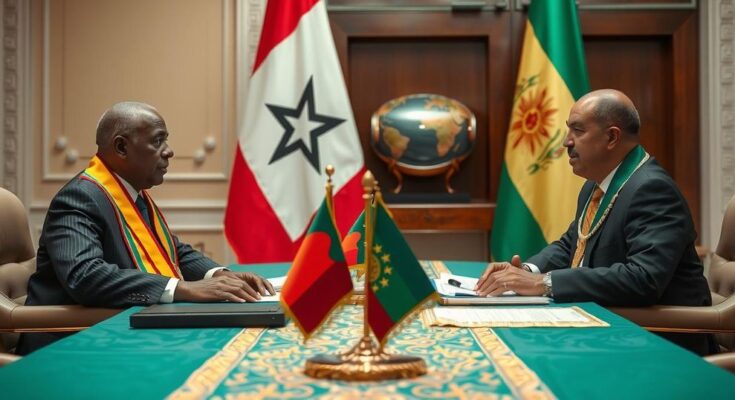Ethiopia seeks to remove Somalia’s Foreign Minister Ahmed Fiqi amid tensions with Egypt, complicating Somalia’s diplomatic strategies. President Hassan Sheikh Mohamud’s visit to Ethiopia resulted in the restoration of ties without Fiqi, who is engaged in discussions with Egypt and Eritrea to enhance their trilateral alliance. This situation illustrates the ongoing geopolitical tensions in the Horn of Africa and raises questions about Somalia’s foreign policy coherence.
Ethiopia is reportedly advocating for the removal of Somalia’s Foreign Minister, Ahmed Fiqi, a move that faces significant pushback from Egypt, complicating Somalia’s foreign relations strategy. This situation has emerged concurrently with Somali President Hassan Sheikh Mohamud’s visit to Ethiopia, where he received a cordial reception from Prime Minister Abiy Ahmed. During their discussions, the two leaders announced the official restoration of diplomatic relations between Somalia and Ethiopia.
Notably absent during this important diplomatic meeting was Foreign Minister Ahmed Fiqi, who is presently engaged in discussions in Egypt with both Egyptian and Eritrean foreign ministers. These talks are primarily focused on fortifying the trilateral alliance between Somalia, Egypt, and Eritrea, which is perceived as a strategy to counteract Ethiopia’s influence in the region. In his place, Somalia’s Minister of State for Foreign Affairs accompanied President Hassan Sheikh, while Ali Balcad, a close advisor to the president, has assumed responsibilities regarding Ethiopia-related matters for the Somali government.
The dynamics of the federal relations within Somalia are tense, particularly concerning Puntland and Jubaland, regions that maintain robust ties with Ethiopia. Observers argue that President Hassan Sheikh’s outreach to Ethiopia signifies an intention to diminish these regional relationships, contributing to existing strains between him and the federal member states.
Ethiopia’s strategic partnership with Puntland and Jubaland has been pivotal in combating regional threats, particularly those posed by militant groups that have historically exploited the porous border. Additionally, Ethiopia has played a crucial role in the restructured African Union peacekeeping mission, including the deployment of Ethiopian troops, further entrenching its influence in Somalia.
Egypt’s reluctance to accept the potential dismissal of Foreign Minister Ahmed Fiqi underscores the geopolitical competition prevalent in the Horn of Africa. Cairo views its bolstered alliances with Somalia and Eritrea as critical to counterbalancing Ethiopia’s expanding power in the region. This is not the first instance of discord regarding the loyalties of Somali officials; for example, the former intelligence chief Mahad Salad was removed from office due to perceived ties with Egyptian interests, raising concerns about the future of Ahmed Fiqi in light of similar pressures.
Analysts have criticized President Hassan Sheikh’s foreign policy as disjointed, driven by personal interests rather than a coherent national strategy. This inconsistency has rendered Somalia susceptible to external influences, ultimately undermining its sovereignty and its recovery from years of conflict. The ongoing struggle for influence between Ethiopia and Egypt represents a larger geopolitical rivalry that continues to shape the fragile political landscape of the Horn of Africa.
The geopolitical landscape of the Horn of Africa is characterized by competition among regional powers, particularly Ethiopia and Egypt, both of which are seeking to enhance their influence over Somalia. The recent tensions regarding the potential replacement of Somali Foreign Minister Ahmed Fiqi reflect the complex interplay of bilateral relations in the region. The restoration of diplomatic ties between Somalia and Ethiopia occurs amidst criticisms of Somalia’s foreign policy, which some argue lacks coherence and is susceptible to external manipulation. Understanding this backdrop is essential to grasping the current unrest in Somali-Ethiopian relations and the implications for regional stability.
The ongoing contention over Foreign Minister Ahmed Fiqi’s position illustrates the complexities of Somalia’s foreign policy and its vulnerability amidst external influences. The competition between Ethiopia and Egypt for political leverage in Somalia is indicative of broader regional rivalries that complicate Somalia’s path toward stability and recovery. As diplomatic engagements evolve, the Somali government’s internal cohesion will be vital in navigating these geopolitical challenges.
Original Source: www.garoweonline.com




